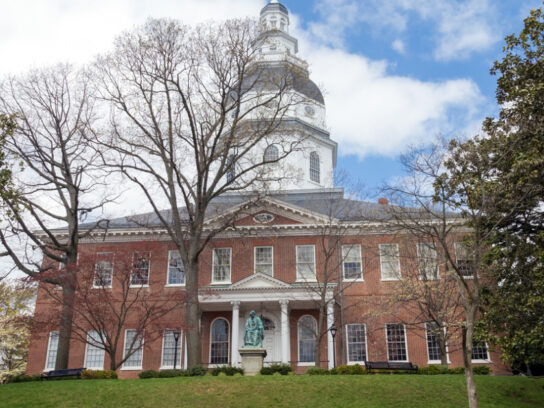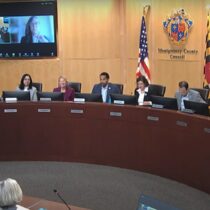
Maryland Governor Wes Moore released his fiscal 2026 budget Wednesday. The $67.3 billion proposal will cut spending, raise some taxes while lowering others, and attempt to close a projected $3 billion budget deficit. The budget proposal is 1.2% higher than last year’s spending plan.
Moore said his budget revolves around four basic principles. They are growing the economy, strengthening the state’s labor force, modernizing government, and fixing the state’s tax code.
“The proposal accomplishes these goals without raising the sales or property tax, and provides a tax cut to nearly two-thirds of Marylanders,” a statement from the Governor’s office said.
Spending Cuts and Taxes
The Governor plans to slash spending by $2 billion to help close the deficit. Moore also proposes withdrawing about $500 million from the Rainy Day Fund. That will leave about $2 billion in the account.
His proposal also calls for overhauling the tax code. If approved, about two thirds of residents would see their taxes fall. The tax cut could average around $170 but could go as high as $300 a year for some residents. However, the Governor’s plan would increase taxes on the wealthiest Marylanders by creating two new tax brackets. People earning more than $500,000 a year would have to pay a 6.25% income tax. Marylanders making $1 million or more would pay a 6.5% income tax.
Moore also has proposed doubling the state tax on sports betting from 15% to 30%, raise the tax on casino table games from 20% to 25%, and increase the tax on recreational cannabis from 9% to 15%.
Promoting Growth
One of the big issues Maryland has faced in recent years is stagnant growth. Last January, Maryland Comptroller Brooke Lierman released a report that showed the state’s economic growth initially stalled in 2017. It has been stagnant since. Moore is trying to change that. He said it is important for the state to attract new businesses, and maintain the businesses that already are here. Moore has proposed cutting the state’s corporate tax rate from 8.25% to 7.99% over a two year period. He also plans to spend hundreds of millions of dollars to invest in businesses of the future such as cybersecurity and life sciences.
Reaction from Former Governor Larry Hogan
Reaction to the Governor’s budget is mixed. Moore has blamed the previous administration for the budget woes the state is now facing. Former Republican Governor Larry Hogan strongly disputes that claim. He posted on social media, “Two years ago, we left a historic surplus. We had a record $5.5 billion in reserves and achieved a complete $10 billion economic turnaround. When we took office, we inherited the worst fiscal situation in Maryland’s history. By the time we left office, we had not only improved the state’s finances but left them in the best shape in state history.”
“We did it by working across the aisle to erase the deficit in our first year and without raising taxes by a single penny. Over eight years, we cut taxes by $4.7 billion while providing record funding for education, transit, and transportation infrastructure,” Hogan added.
Montgomery County Executive Speaks Out
Montgomery County Executive Marc Elrich also reacted to the Governor’s budget. He issued a statement that said, “I applaud the Governor’s leadership in navigating the dual challenges of a fiscal crisis and shifting federal policies with bold solutions that promote economic growth and progressive tax reform.”
“As Governor Moore has rightly pointed out, our state’s strength lies in its ability to create pathways for work, wages, and wealth. While I have not yet had a chance to carefully review the budget, Governor Moore is clearly leading in the right direction, and I look forward to partnering with him and the General Assembly to build on this strong foundation and deliver the economic growth and opportunity that all Marylanders deserve,” Elrich said.
More Reaction
State Senator Craig Zucker (D-Montgomery County) serves on the Budget and Taxation Committee. He told MCM, “Over the course of 90 days, we will be reviewing the budget and refining it. Ultimately, it’s going to be balanced, protect Marylanders, while protecting the most vulnerable and putting Maryland in the best position to be successful. There is funding within the budget allocated to Montgomery County that we will protect. We will ensure that when the budget is passed, it will bring back the needed resources.”
State Senator Justin Ready (R-Carroll and Frederick Counties) is a member of the Finance Committee. He said, “The Governor was on the right track with what he said about needing to stimulate economic growth and make government more efficient. Unfortunately his proposal to raise taxes on people who are most likely to be running in or investing in job creation is counter-productive to that goal.”
“I am glad he is putting forth cuts of around $2 billion, however, the deficit is $3 billion. The General Assembly should take action to get the rest of the way there by reducing our rate of spending increases to resolve the entire deficit. Raising taxes and fees including regressive taxes like doubling the emissions testing fee should be off the table,” Ready added.
“I am thankful for Governor Moore’s continued commitment to public safety in Maryland,” said Montgomery County Chief of Police Marc Yamada. “This is an approach that balances accountability and care for our communities. Despite the impacts of a structural deficit his commitment to sustain the State Aid for Police Protection ensures the safety and well being of my police officers. I appreciate the focus on both good policing and addressing the underlying issues that drive crime in our communities. The reduction in crime we’ve seen in the past two years is due to the hard work of every public safety professional, and the deep partnership between our county and our state government. The governor’s recent visit to the Montgomery County Drone as a First Responder Operations Center is further evidence of his support to innovations in public safety.”
What’s Next
The budget now goes to the House of Delegates for its review before it reaches the State Senate. Changes are expected. By law, the Maryland General Assembly must approve a balanced budget.


Comments are closed.